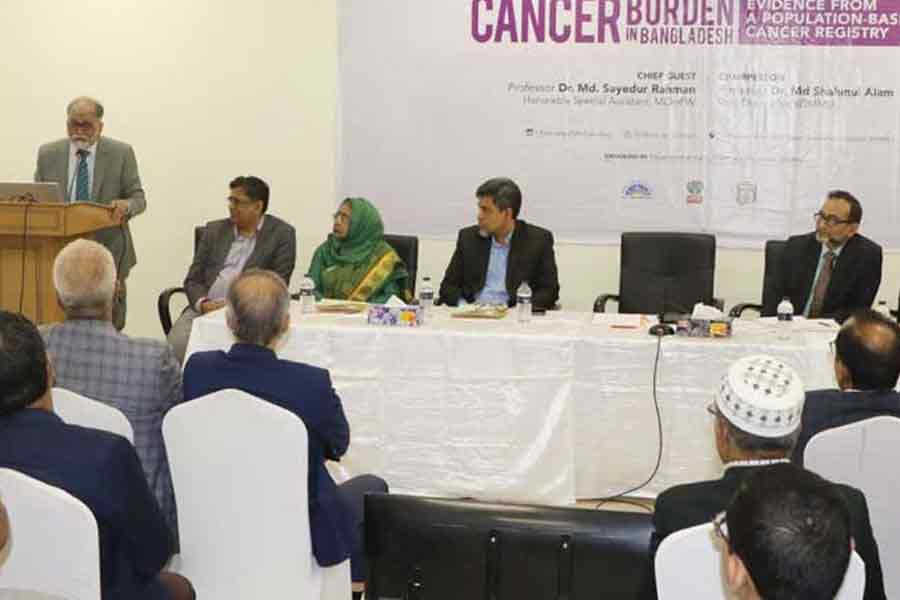Cancer affects 106 in every 100,000 people in Bangladesh: Study
Breast, oral, stomach, respiratory, and cervical cancers are most prevalent

Published :
Updated :

A study has revealed that 106 out of every 100,000 people in Bangladesh are diagnosed with cancer.
According to the findings, 53 new cancer cases emerge per 100,000 people annually, and the disease accounts for 12 per cent of total deaths.
The findings were presented on Saturday at an event at the super-specialised hospital of Bangabandhu Sheikh Mujib Medical University (BSMMU), titled “Cancer Burden in Bangladesh: Population-Based Cancer Registry”.
The study identified 38 types of cancer affecting people in Bangladesh, with breast, oral, stomach, respiratory, and cervical cancers being the most prevalent.
STUDY FINDINGS
Lead researcher Dr Khalequzzaman, an associate professor at BSMMU’s public health and informatics department, said the study began in July 2023 in Hossainpur Upazila of Kishoreganj.
So far, 46,631 families, with over 200,000 participants, have been included in the study, comprising 48.4 per cent men and 51.6 per cent women.
According to the study, 214 cancer patients participated in the research.
The cancer prevalence rate stands at 106 per 100,000 people — 118 per 100,000 among men and 96 per 100,000 among women.
A total of 92.5 per cent of cancer patients were aged between 18 and 75, while 2.4 per cent were under 18, and 5.1 per cent were above 75.
The study revealed that 16.8 per cent of cancer patients had breast cancer, 8.4 per cent had oral cancer, 7 per cent had stomach cancer, 7 per cent had laryngeal cancer, and 5.1 per cent had cervical cancer.
Lung, respiratory, and stomach cancers were identified as the leading causes of cancer-related deaths.
NEED FOR A POPULATION-BASED CANCER REGISTRY
Dr Khalequzzaman said, “Cancer is one of the leading causes of death worldwide. In the absence of a population-based cancer registry, or PBCR, in Bangladesh, we have relied on data from neighbouring countries to estimate cancer prevalence.
“This has led to limitations in understanding the actual situation. Establishing a PBCR in Bangladesh was crucial to accurately assess the cancer burden, which is why this study was conducted,” he said.
CALL FOR MORE RESEARCH
Dr Sayedur Rahman, special assistant to the Chief Adviser Muhammad Yunus, stressed the importance of research in advancing knowledge.
“BSMMU should conduct research that benefits patients. The government will continue to support studies that help the people of this country,” he said.
BSMMU Vice-Chancellor Dr Shahinul Alam said funding would not be an issue for research that meets public expectations.
“The statistics from the population-based cancer registry led by BSMMU will play a significant role in cancer prevention, treatment, and patient care. At the same time, these findings will open new avenues for cancer research in Bangladesh,” the VC said.
The study was funded by the Directorate General of Health Services’ Non-Communicable Disease Control Programme and BSMMU.


 For all latest news, follow The Financial Express Google News channel.
For all latest news, follow The Financial Express Google News channel.